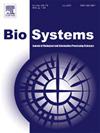When Maxwell’s Demon leaves the room
IF 1.9
4区 生物学
Q2 BIOLOGY
引用次数: 0
Abstract
This work revisits the Maxwell Demon paradigm to explore its implications for evolutionary dynamics from an information-theoretic perspective. By removing the Demon as an intentional agent, we reinterpret the emergence of order as a natural outcome of physical laws combined with stochastic processes. Using models inspired by information theory, such as binary and Z-channels, we show how random fluctuations (e.g., stochastic resonance) can decrease entropy, generate mutual information, and induce non-ergodicity. These dynamics highlight the role of memory and correlation as emergent features of purely physical interactions without recourse to purposeful agency. In this framework, evolutionary exaptations, rather than sole adaptations, emerge as key drivers of biological evolution. Finally, we connect our analysis with recent contributions on agency and memory, underscoring the relevance of informational concepts for understanding the purposeless yet structured dynamics of evolutionary processes.
麦克斯韦的恶魔离开房间的时候。
这项工作重新审视了麦克斯韦妖范式,从信息论的角度探索其对进化动力学的影响。通过移除恶魔作为一个有意的代理人,我们将秩序的出现重新解释为物理定律与随机过程相结合的自然结果。使用受信息论启发的模型,如二进制和z通道,我们展示了随机波动(例如随机共振)如何减少熵,产生互信息,并诱导非遍历性。这些动态强调了记忆和关联作为纯粹物理交互的紧急特征的作用,而不依赖于有目的的代理。在这个框架中,进化的期望,而不是单一的适应,成为生物进化的关键驱动力。最后,我们将我们的分析与最近对代理和记忆的贡献联系起来,强调信息概念与理解进化过程中无目的但结构化的动态的相关性。
本文章由计算机程序翻译,如有差异,请以英文原文为准。
求助全文
约1分钟内获得全文
求助全文
来源期刊

Biosystems
生物-生物学
CiteScore
3.70
自引率
18.80%
发文量
129
审稿时长
34 days
期刊介绍:
BioSystems encourages experimental, computational, and theoretical articles that link biology, evolutionary thinking, and the information processing sciences. The link areas form a circle that encompasses the fundamental nature of biological information processing, computational modeling of complex biological systems, evolutionary models of computation, the application of biological principles to the design of novel computing systems, and the use of biomolecular materials to synthesize artificial systems that capture essential principles of natural biological information processing.
 求助内容:
求助内容: 应助结果提醒方式:
应助结果提醒方式:


